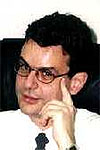Always self-appointed, they answer to no constituency. Though unelected and ignorant of local realities, they confront the democratically chosen and those who voted them into office. A few of them are enmeshed in crime and corruption. They are the non-governmental organizations, or NGO's.
Some NGO's - like Oxfam, Human Rights Watch, Medecins Sans Frontieres, or Amnesty - genuinely contribute to enhancing welfare, to the mitigation of hunger, the furtherance of human and civil rights, or the curbing of disease. Others - usually in the guise of think tanks and lobby groups - are sometimes ideologically biased, or religiously-committed and, often, at the service of special interests.
NGO's - such as the International Crisis Group - have openly interfered on behalf of the opposition in the last parliamentary elections in Macedonia. Other NGO's have done so in Belarus and Ukraine, Zimbabwe and Israel, Nigeria and Thailand, Slovakia and Hungary - and even in Western, rich, countries including the USA, Canada, Germany, and Belgium.
Regardless of their persuasion or modus operandi, all NGO's are top heavy with entrenched, well-remunerated, extravagantly-perked bureaucracies. Opacity is typical of NGO's. Amnesty's rules prevent its officials from publicly discussing the inner workings of the organization - proposals, debates, opinions - until they have become officially voted into its Mandate. Thus, dissenting views rarely get an open hearing.
Contrary to their teachings, the financing of NGO's is invariably obscure and their sponsors unknown. The bulk of the income of most non-governmental organizations, even the largest ones, comes from - usually foreign - powers. Many NGO's serve as official contractors for governments.
NGO's serve as long arms of their sponsoring states - gathering intelligence, burnishing their image, and promoting their interests. There is a revolving door between the staff of NGO's and government bureaucracies the world over. The British Foreign Office finances a host of NGO's - including the fiercely "independent" Global Witness - in troubled spots, such as Angola. Many host governments accuse NGO's of - unwittingly or knowingly - serving as hotbeds of espionage.
Very few NGO's derive some of their income from public contributions and donations. The more substantial NGO's spend one tenth of their budget on PR and solicitation of charity. In a desperate bid to attract international attention, so many of them lied about their projects in the Rwanda crisis in 1994, recounts "The Economist", that the Red Cross felt compelled to draw up a ten point mandatory NGO code of ethics. A code of conduct was adopted in 1995. But the phenomenon recurred in Kosovo.
All NGO's claim to be not for profit - yet, many of them possess sizable equity portfolios and abuse their position to increase the market share of firms they own. Conflicts of interest and unethical behavior abound.
Cafedirect is a British firm committed to "fair trade" coffee. Oxfam, an NGO, embarked, three years ago, on a campaign targeted at Cafedirect's competitors, accusing them of exploiting growers by paying them a tiny fraction of the retail price of the coffee they sell. Yet, Oxfam owns 25% of Cafedirect.
Large NGO's resemble multinational corporations in structure and operation. They are hierarchical, maintain large media, government lobbying, and PR departments, head-hunt, invest proceeds in professionally-managed portfolios, compete in government tenders, and own a variety of unrelated businesses. The Aga Khan Fund for Economic Development owns the license for second mobile phone operator in Afghanistan - among other businesses. In this respect, NGO's are more like cults than like civic organizations.
Many NGO's promote economic causes - anti-globalization, the banning of child labor, the relaxing of intellectual property rights, or fair payment for agricultural products. Many of these causes are both worthy and sound. Alas, most NGO's lack economic expertise and inflict damage on the alleged recipients of their beneficence. NGO's are at times manipulated by - or collude with - industrial groups and political parties.
It is telling that the denizens of many developing countries suspect the West and its NGO's of promoting an agenda of trade protectionism. Stringent - and expensive - labor and environmental provisions in international treaties may well be a ploy to fend off imports based on cheap labor and the competition they wreak on well-ensconced domestic industries and their political stooges.
Take child labor - as distinct from the universally condemnable phenomena of child prostitution, child soldiering, or child slavery.
Child labor, in many destitute locales, is all that separates the family from all-pervasive, life threatening, poverty. As national income grows, child labor declines. Following the outcry provoked, in 1995, by NGO's against soccer balls stitched by children in Pakistan, both Nike and Reebok relocated their workshops and sacked countless women and 7000 children. The average family income - anyhow meager - fell by 20 percent.
(Note: You can view every article as one long page if you sign up as an Advocate Member, or higher).




